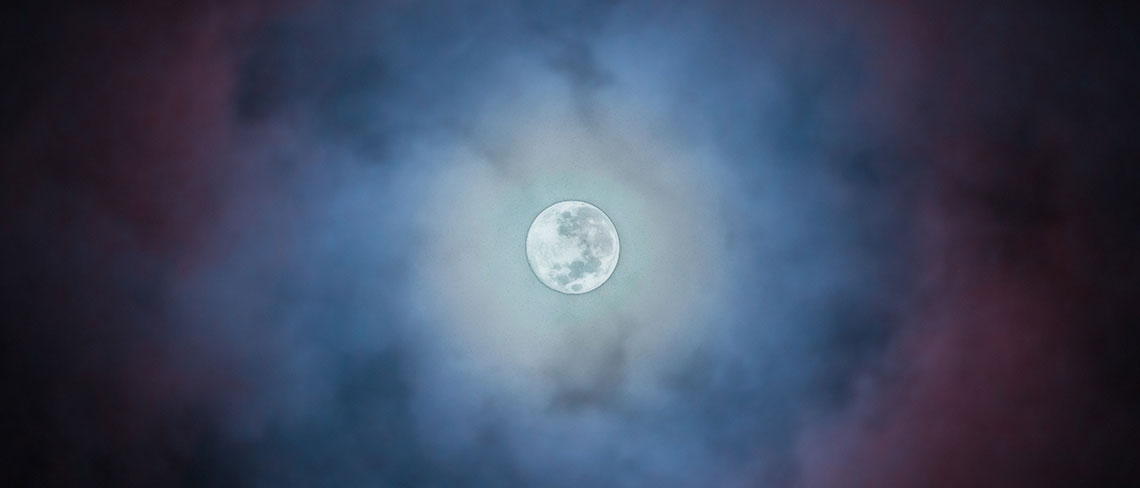
With no less than four Supermoons gracing our skies between February and May this year, sleep experts at Tempur explore the effects of the moon on sleep and unpick lunar fact from fiction.
From restless nights and inducing labour, to transforming humans into werewolves and impacting harvests, superstitions about the moon have long fed the imagination. Whilst the science behind the changing phases of the moon is understood, the effects of full moons is less clear. So, as we approach the first supermoon of 2020 (9 February), sleep experts at Tempur reveal the science and unpick fact from fiction.
The changing phases of the moon means it may appear as a crescent, half circle, or full disk, depending on the angle that the sun shines on it. These different phases can be categorised into four main cycles – New Moon, First Quarter, Full Moon, Last Quarter – and see the moon change from full darkness to full illumination.
When a full moon occurs, every 29.5 days, the entire face of the moon is lit up by the sun’s rays, which is why the night sky appears to be so bright. Supermoons only happen a few times a year and occur when the full moon coincides with the moon’s closest approach to Earth in its orbit.
So how does this affect us?
There are numerous links between the moon and our behaviour, however, most often, the effects people experience are imaginary or mere superstitions. Suggestions that a particular phase of the moon causes strange behaviour or an increase in birth rates are tenuous at best. However, there are links that may hold some truth…
Menstruation – long been thought of as influenced by the lunar cycle. In fact, scientific research has found that a large number of women do synch with the moons pattern. 1 A simple explanation for this, however, could be that the connection is merely due to the average length of a menstrual cycle (29 days) being similar to that of the lunar cycle (29.5 days), as opposed to the mystical power of the moon.
Fertility – the idea that pregnant women are more likely to give birth on a full moon is a well-known superstition. Unfortunately, evidence gleaned from looking at birth records during different lunar phases is inconsistent, so this appears to be nothing more than an old wives’ tale. 2
Mood – people have been associating fluctuations in mood and behaviour to the moon for thousands of years. Some experts say that a full moon makes people more prone to aggressive and combative behaviour, or more introspective and anxious due to the intensity of energy it brings. Whilst you may recognise some of these behaviours in yourself or people around you near a full moon, the research is limited. The changes in behaviour are more logically linked to sleep.
Sleep – many people are convinced of the impact of a full moon on sleep and they may not be wrong. Research has found that around the time of a full moon both quality and quantity of sleep is negatively affected. 3 This is possibly a relic from ancient times when the moon was responsible for synchronising human behaviour and is a well observed phenomenon in other animals. Again, whilst some put this down to a mysterious lunar clock, a more logical explanation is that the amount of natural night-time light you’re exposed to increases around a full moon, thus impacting your ability to sleep. This doesn’t however explain the research that found that the full moon affected people – who didn’t know what time it was – sleeping in a controlled environment. 4
Whatever you choose to believe, there’s no doubt that there are some curious links between the moon and our ever changing physical and emotional state.
And there’s certainly some evidence that the lunar cycle has the ability to affect sleep, so make sure you err on the side of caution and invest in good black-out blinds and a cosy sleep mask to maximise your chances of a restful night’s sleep for the four Supermoons that are approaching.
-Ends-
Notes to editors:
1 https://helloclue.com/articles/cycle-a-z/myth-moon-phases-menstruation
2 https://www.sciencedirect.com/science/article/pii/S0301211519300880
3 https://www.unibas.ch/en/News-Events/News/Uni-Research/Bad-Sleep-Around-Full-Moon-Is-No-Longer-A-Myth.html
4 https://www.cell.com/current-biology/fulltext/S0960-9822(13)00754-9
For further press information, please contact:
Elsa Findlay | Jo Kendall | Julie Aguilera
Rooster PR
T: +44 (0)20 3440 8930
E: [email protected]
About Tempur
Tempur researches, develops, engineers, manufactures and distributes mattresses, pillows and other sleep products to improve the sleep experience worldwide.
Tempur mattresses and pillows are made from a formulation of the brand’s proprietary pressure absorbing TEMPUR material, originally developed by NASA scientists in the 1970s to support and cushion astronauts during lift-off.
Tempur mattresses offer maximum quality, comfort, support, durability, value for money and aid a restorative night’s sleep.
Tempur products can be purchased direct via the Tempur UK website, from any of twelve Tempur brand stores and outlets, or from leading retailers including Dreams, John Lewis, Bensons for Beds, Furniture Village and Land of Beds.
Trusted and promoted by medical practitioners around the world, Tempur is the only mattress product recognised by NASA and certified by the Space Foundation.
Tempur is a subsidiary of Tempur Sealy International Inc.
Tempur – a mattress like no other.
Follow Tempur:
- Twitter: @TempurUK
- Facebook: @TempurUK
- Instagram: @tempur_uk
- YouTube: https://www.youtube.com/user/TempurUKonTV






